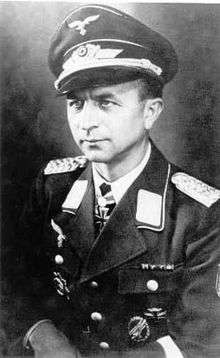Erich Walther
Friedrich Erich Walther (5 August 1903 – 26 December 1948) was a German paratroop general during World War II. He was a recipient of the Knight's Cross of the Iron Cross with Oak Leaves and Swords of Nazi Germany. Walther commanded the Hermann Göring 2nd Parachute Panzer-Grenadier Division in East Prussia. He was promoted to Generalmajor on 30 January 1945. Walther surrendered the Red Army on 8 May 1945. He died at Soviet Special Camp 2 on 26 December 1948.
Erich Walther | |
|---|---|
 | |
| Born | 5 August 1903 Gorden |
| Died | 26 December 1948 (aged 45) Soviet Special Camp 2 |
| Allegiance | |
| Service/ | |
| Rank | Generalmajor |
| Commands held | 2nd Parachute Panzer Division Hermann Göring |
| Battles/wars | World War II |
| Awards | Knight's Cross of the Iron Cross with Oak Leaves and Swords |
World War II
During World War II Walther fought over much of Europe as a paratroop officer.
In April 1940 he participated in the Norwegian Campaign as a Captain. In May 1940 Walther participated in the airborne attack in the Netherlands and was promoted to the rank of Major. In May 1941 he participated in an airborne attack on the island of Crete. Since September 1941 Walther fought on the eastern front, fighting near Leningrad. In January 1942 he was promoted to a Lieutenant Colonel. In July 1943 Walther fought on the island of Sicily, later in mainland Italy. In September 1944 Walther became battlefield commander, fighting in the Arnhem area. In the end of September 1944 he became Commander in the East Front, fighting in East Prussia. In January 1945 until he became a Soviet Prisoner of war on May 8 the same year, Walther was ranked Generalmajor.
Awards
- Iron Cross (1939) 2nd Class (18 April 1940) & 1st Class (26 April 1940)[1]
- German Cross in Gold on 31 March 1942 as Major in the I./Fallschirmjäger-Regiment 1[2]
- Knight's Cross of the Iron Cross with Oak Leaves and Swords
References
Citations
- Thomas & Wegmann 1986, p. 348.
- Patzwall & Scherzer 2001, p. 495.
- Scherzer 2007, p. 767.
Bibliography
- Patzwall, Klaus D.; Scherzer, Veit (2001). Das Deutsche Kreuz 1941 – 1945 Geschichte und Inhaber Band II [The German Cross 1941 – 1945 History and Recipients Volume 2] (in German). Norderstedt, Germany: Verlag Klaus D. Patzwall. ISBN 978-3-931533-45-8.CS1 maint: ref=harv (link)
- Scherzer, Veit (2007). Die Ritterkreuzträger 1939–1945 Die Inhaber des Ritterkreuzes des Eisernen Kreuzes 1939 von Heer, Luftwaffe, Kriegsmarine, Waffen-SS, Volkssturm sowie mit Deutschland verbündeter Streitkräfte nach den Unterlagen des Bundesarchives [The Knight's Cross Bearers 1939–1945 The Holders of the Knight's Cross of the Iron Cross 1939 by Army, Air Force, Navy, Waffen-SS, Volkssturm and Allied Forces with Germany According to the Documents of the Federal Archives] (in German). Jena, Germany: Scherzers Militaer-Verlag. ISBN 978-3-938845-17-2.CS1 maint: ref=harv (link)
- Thomas, Franz; Wegmann, Günter (1986). Die Ritterkreuzträger der Deutschen Wehrmacht 1939–1945 Teil II: Fallschirmjäger [The Knight's Cross Bearers of the German Wehrmacht 1939–1945 Part II: Paratroopers] (in German). Osnabrück, Germany: Biblio-Verlag. ISBN 978-3-7648-1461-8.CS1 maint: ref=harv (link)
| Military offices | ||
|---|---|---|
| Preceded by none |
Commander of Fallschirmjäger-Regiment 4 17 September 1942 – 15 March 1944 |
Succeeded by Major Franz Graßmel |
| Preceded by Oberst Helmuth Hufenbach |
Commander of Fallschirm-Panzergrenadier-Division 2 "Hermann Göring" March 1945 – 8 May 1945 |
Succeeded by none |